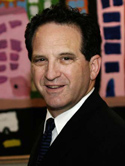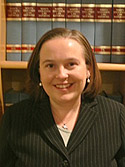About Us
Our Attorneys
Michael J. Eig, the founder and owner of the firm, has been practicing special education law and advocacy in the metropolitan D.C. area since 1975. His educational background includes degrees in cultural anthropology and education from Brandeis University (1970), a master’s in education and social policy from Harvard University (1972), and a J.D. from Georgetown University Law Center (1975).
Paula A. Rosenstock holds a B.A. in psychology from Tufts University, magna cum laude, and a J.D. from The George Washington University Law School. She was admitted to the Virginia Bar in 2003, the District of Columbia Bar in 2005, and the Maryland Bar in 2014. She is admitted to practice before all courts in the Commonwealth of Virginia, including the Supreme Court of Virginia.
Ms. Rosenstock has a background in special education and disability-related work. During law school she worked as a summer law clerk for Michael J. Eig and Associates. Prior to that, she worked in several schools and programs for children with disabilities. Prior to joining Michael J. Eig and Associates, Ms. Rosenstock worked at a law firm in Fairfax County, Virginia, where she concentrated in family law. While there, she gained extensive litigation experience and assisted clients with divorce, child custody, visitation, and property distribution.
Ms. Rosenstock has spent nearly her entire legal career practicing special education law in the Washington D.C. area. She provides support and guidance to parents seeking to secure appropriate educational services for their children through the IEP process, administrative due process appeals and in federal court. She has also presented at the local and national level on issues related to special education, including addressing the legal needs of twice exceptional learners, issues related to distance learning during the national pandemic, and the importance of the Supreme Court’s 2017 Endrew F. Decision.
Ms. Rosenstock is married with two school-aged children, and one dog. Her role as a mother has helped her form a deeper understanding of the challenges faced by her clients as they advocate for their children and navigate through the educational system.
Meghan M. Probert holds a B.A. in History and Spanish from Saint Michael’s College, cum laude, and a J.D. from George Mason University School of Law. She is a member of the District of Columbia Bar as well as numerous federal courts. During law school, Ms. Probert was a member of the Journal of Law, Economics & Policy. She worked with the Public Defender’s Office in Loudoun County, Virginia, as well as with various civil litigation firms in northern Virginia specializing in insurance defense, real estate, and immigration.
Ms. Probert has worked in special education law since 2012, providing support and guidance to parents seeking to secure appropriate educational services for their children through the IEP process, administrative due process appeals and in federal court. She has given presentations at multiple conferences regarding various hot topics in special education law for parents, educational advocates, and other legal professionals. Ms. Probert has a longstanding passion for working with children and adults with disabilities, including working with Best Buddies, an organization creating opportunities for one-to-one friendships for people with intellectual and developmental disabilities.
Matthew B. Bogin has been helping families with special needs members throughout the D.C. metropolitan area for over thirty-five years. He is well-respected for his championing the varying rights of special needs clients. Currently, his particular focus is ensuring that families with special needs members complete and review planning to ensure a successful future for these children.
Why We Do What We Do
A long time ago, I represented a special little boy named Maury. Maury had been developing wonderfully in his first years of life until three, when he was struck with many days of encephalitis-like strokes which tragically reduced his functioning to that of a one to five month old. He was cortically blind, could not sit, walk, or talk. He was still a beautiful kid and the most frustrating part of the tragedy was that he had a blockage at the base of his brain; it was completely unknown if stimuli was getting to his brain because he had no way to tell us.
Eventually, we advocated against the school system for almost ten days of Due Process Hearings, seeking a number of hours each day of individual therapies, along with an afternoon with a one-on-one aide in a regular preschool class. We operated on the assumption that Maury was processing stimuli, at least to some degree, but we really did not know.
We won, and the intensive services began. I lost track for a year or two, but was then told that Maury had become very ill and had died, I think at age seven. Yet another tragedy; Maury was gone.
But there is an important postscript to Maury’s story. At his funeral service, we heard his uncle speak of the last months. He told us that they had continued to wonder whether all of this effort was making any difference to Maury. Was he getting any of it? The uncle then went on to tell us that they recently had obtained some state-of-the-art software that enabled a computer to process responses based upon left or right eye blinks. They had tried it with Maury and, as his uncle told us (with a smile, not tears), “Maury began to talk to us.”
It did not last very long; Maury became terminally ill a little while later. But that did not take away from the value, the quality of life, that we all helped create or preserve. Nothing could ever diminish that.
That is why we do what we do.
-Michael J. Eig
And, Every Now and Then, Miracles Can Happen
And then there was Matt, a bright, engaging fourteen-year-old who had a good family and all the support in the world. He also happened to be stricken with the most severe case of Obsessive-Compulsive Disorder anybody had ever seen. He literally spent seven months in his room at home unable to get out because of his perception of the contamination that awaited him on the other side of his door. He took seven to ten hour showers. He listened to an inner spirit in a language incomprehensible to the rest of us. He appeared doomed to an institutionalized, miserable life.
But his parents never accepted that and, with our help, advocated within their local school system for a very intensive (and very expensive) residential program specializing in adolescents like Matt. Through a couple of years of fighting through Due Process and federal court hearings, we eventually prevailed and the school system was ordered to place and fund Matt in this one-of-a-kind program.
Of course, the school system complied with the orders, but the program did not work. After more than a year of residential care and education, Matt returned home apparently no better off than when he had left. A day therapeutic program was offered by the school system, but Matt only lasted a few days in that school, and then he took back to his room and his self-imposed solitude. It seemed over.
But, once again, his parents could not accept the bleak future ahead for their son, and continued to explore programs, eventually coming up with a new one, a residential school in New England that was willing to give it a try if Matt would just get up there. We went back to the school system and, this time, we did not have to appeal anything. School system staff had also taken a personal interest in this intriguing young man, and they agreed to send him up to the new school, at another substantial cost to the system.
That’s when the miracles started; Matt started to improve and he never stopped. This young man who could not go anywhere for fear of contamination, learned to live in a dorm with other boys, learned to interact with them, even learned to do his share of daily chores, including cleaning the common bathroom. He gradually went to classes more and more, and excelled in them. He earned a future, a rather bright one in fact that he is now living.
Sometimes, we fight and we win. Sometimes, we lose. And, every once in a while, after all of that occurs, we get together with our opponents and finally come up with a solution that literally saves a young person’s life. That is also why we do what we do.
- Michael J. Eig





